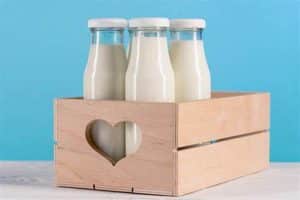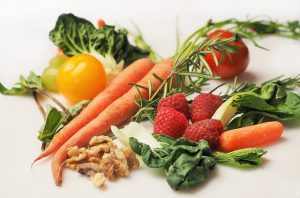Learn what your body needs to keep you energized throughout the day. Watch the video or read the following transcript.
Subscribe to our YouTube Wellness Channel.
This month, I thought we’d take a step back from all the specific things I typically talk about, like vitamins, minerals and typical foods, to focus on macronutrients. Macronutrients are the three nutrients (i.e. carbohydrates, fats and proteins) your body needs in large amounts. Almost every food has a combination of macronutrients. Your body needs these components to:
• provide energy
• maintain bone structure and systems that keep the heart, lungs, liver and kidneys operating
• regulate the chemical processes that occur in the body every day
If you think of your body like a car, you can have the prettiest, shiniest car in the world, but it won’t go anywhere without gas. Macronutrients provide your body with the gas (i.e. energy) it needs to run.
Macronutrients and the energy produced from them are important for cell growth for breathing, blood transport, walking, talking, exercising, and picking things up – everything depends on energy. If your body doesn’t have energy, in the form of calories, then your body won’t function well.
Carbohydrates
Carbohydrates are broken down in your body as glucose, your body’s preferred source of energy. Your body is very capable of breaking down carbohydrates in any form whether they are simple or complex carbohydrates.
Simple carbohydrates (e.g. sugar, syrup, soda, honey) quickly breaks down into blood glucose and gives your body a boost of energy. That’s why people eat a candy bar for a quick pick me up.
Complex carbohydrates are found in foods like whole-grain bread and fruit. They take longer to break down but give your body a great steady source of energy. Elite runners tend to load up on complex carbohydrates before a race for steady source of energy to carry them through the whole race.
Complex carbohydrates are typically the source of a lot of your fiber, which is important for maintaining regularity. It also gives you a sense of fullness.
When you hear people say they’re on a low carb diet and carbs will make them gain weight, consider that a gram of carbohydrates equals four calories and a gram of fat equals nine calories. Consuming more calories than what you burn leads to weight gain.
When looking at a jar of raspberry jelly and can of pineapple slices, you’ll find all the calories come from carbohydrates. Two slices of pineapple equal 60 calories and include 15 grams of carbohydrates.
Protein
We all know that protein is essential for the body to grow, build, repair tissues and protect lean body mass. It’s part of our muscles, which attach to bones, so we can move our bones up and down. The heart is a big muscle, and protein is needed to keep the heart pumping. Proteins also help to maintain skin integrity.
Proteins are composed of amino acids, and although I’m not going to get too technical about them, you should know there are two types: non-essential and essential and amino acids. Non-essential amino acids are produced by your body. Your body pulls what it needs from different foods to produce these acids. Essential amino acids must be consumed for your body to form them. You can get these from protein-rich foods including:
• meat
• poultry
• fish
• eggs
• milk
• cheese
For example, a five-ounce can of solid white albacore tuna has 110 calories. Every calorie comes from protein. There are no carbohydrates or fats.
If you follow a vegetarian or vegan diet, you should eat a variety of plant proteins to get the essential acids needed including:
• beans and lentils
• nuts and seeds
• grains
• fruits
• vegetables
With planning, you can still get all the essential amino acids you need.
Fat
The last and most concentrated form of energy is fat. It cushions your organs, helps make certain hormones and absorbs fat-soluble vitamins. It also keeps your skin nice and soft, so you need fat in your diet.
There are three types of fat: unsaturated fats, saturated and trans fats. Unsaturated fats are healthy fats that mainly come from vegetables, nuts and fish. Saturated and trans fats are unhealthy fats. Saturated fats include red meat (e.g. beef and lamb), pork, skin-on chicken, whole milk, cheese and eggs. Trans fats have pretty much been eliminated from most of the American diet because over the years it’s been the lead cause of heart disease.
Regardless of the fat type, all have the same amount of calories per gram – nine.
When comparing vegetable and olive oil, both equal 120 calories per one-tablespoon serving and one tablespoon of that is fat because neither contains carbohydrates or proteins, but each includes different types of fat.
Vegetable oil contains 14 grams of fat – one gram of saturated, four grams of polyunsaturated and nine monounsaturated fat. Olive oil contains the same amount of fat, but it has different amounts of saturated, polyunsaturated and monounsaturated fat.
Both are cholesterol-free because they are plant-based. Any food that originates from plants are going to be cholesterol-free.
Alcohol
Alcohol, which many people ask me about, is actually a fourth source of energy, but it is not an essential nutrient. It does provide energy in the form of calories, about seven calories per gram, but it doesn’t contribute to your nutrition.
Balanced Meals
To balance your diet, you need carbohydrates, proteins and fats. A gram of carbohydrate is equal to four calories and the same with proteins. A gram of fat is about nine calories.
Don’t limit yourself to certain foods. There’s no such thing as bad and good foods. It’s all about balance.
A lot of people like to eat nuts for protein, but a serving of 28 lightly salted low sodium almonds (i.e. one ounce), which is equal to 170 calories, has 16 grams of fat, five grams of carbohydrates and six grams of protein. A nut contains all the macronutrients though most of the calories are from fat, which includes a mix of saturated, polyunsaturated and monounsaturated fats.
In addition to macronutrients, your body needs vitamins, minerals, fiber and water for a healthy diet. It’s fine to go a day or two without a few of these, but in the long run your body needs all seven components for a balanced diet.
For example, nothing bad would happen by not eating fat for a couple of days; however, doing without water or other fluids should be limited to a few hours. Despite needing it every day, water isn’t considered a macronutrient because it doesn’t provide calories or energy and it has very little nutritional value. Water is essential to keeping your body well hydrated, which is needed for all the chemical processes that occur within your body every day. Learn about the importance of hydration and foods and beverages that can help from What’s Cooking? Hydration.
Micronutrients are vitamins and minerals your body needs. Your body needs micronutrients in varying amounts. For example, micronutrients like copper, manganese and cobalt can be consumed in daily foods because only a tiny amount is needed. However, larger amounts of certain micronutrients (e.g. calcium, Vitamin D, sodium and potassium) are needed. Taking supplements may be necessary if your meals lack the larger amounts your body needs.
I always stress balance because calculating every little micronutrient, all the macronutrients and the calories every day would be exhausting. Balance is important. By eating a variety of foods, your body will get the micro and macronutrients it needs.
If you are interested in learning about more wonderful foods and recipes, read more of my nutrition articles.


